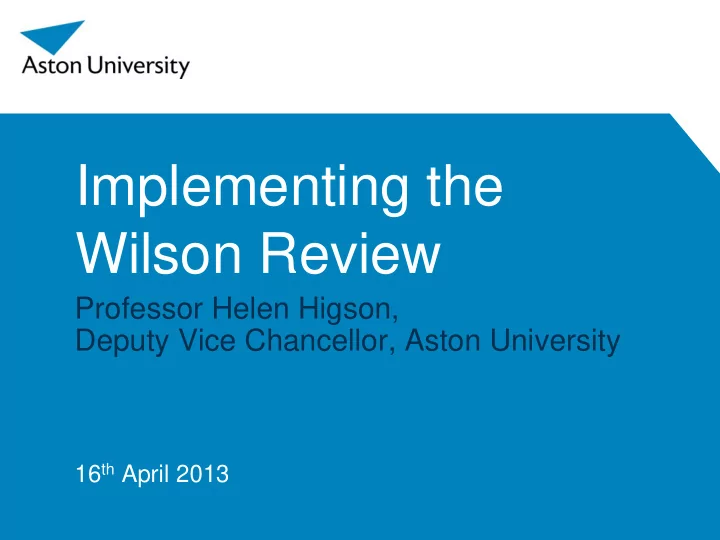

Implementing the Wilson Review Professor Helen Higson, Deputy Vice Chancellor, Aston University 16 th April 2013
Overview ► Personal involvement ► Key recommendations ► Placement research ► Case Studies ► Why is this so important?
Personal involvement/Context ► Employability at Aston: the placement year, graduate internships and entrepreneurial skills ► Research into the beneficial effect of the placement year ► “the central role of universities in providing high ‐ level skills” ► “a large number of highly diverse domains” ► “the concepts of collaborative advantage also have merit and there are many examples of consortia of universities aggregating their capabilities to meet business needs”
Key recommendations ► Networking between universities and the business community is a critical component of an efficient innovation ecosystem ► Sandwich degrees should be encouraged through a new compact between students, universities, government and employers, reflecting the benefits to all parties from the enhanced employment outcomes arising from them ► every full ‐ time undergraduate student should have the opportunity to experience a structured, university ‐ approved undergraduate internship ► Universities should reflect on the opportunities that are provided for students to develop employability skills through the formal learning methodologies used within the university and ensure that students are able to articulate the skills that they have developed ► Foundation degrees should be reaffirmed as a qualification
Work experience changes your life: research informed practice ► ‘Placements and degree performance: Do placements lead to better marks, or do better students choose placements?’ (Driffield, Foster and Higson, 2011) ► How to encourage student engagement in placement learning ’ (Andrews, Higson, Green and Jones, 2012) ► ‘ Student Engagement and Learning: The Pedagogical and Practical Value of Formal Work Placements’ (Higson, Green and Jones 2012) ► ‘No regrets? Measuring the career benefits of a psychology placement year’ (Moores and Reddy, 2011)
Case Study (1): Jins Tom Arambankudy (BEng Electrical Electronics, EDF Energy Nuclear Generation Ltd ► “Aston’s graduate employability ranking attracted me to join the University. … the degree had a laboratory dependent structure which stood out from those offered by other universities.” ► “The Placement team helped me to prepare my CV, provided support materials to succeed at interviews, assessment centres. ” ► “I was involved in many on -going projects and also took on a few new ones to enhance the functionality of the Delivery team and CTT as whole. ” ► “ The work I carried out during the placement was widely appreciated and a few systems that I developed were recognised as having potential to be use by other training departments in EDF.” ► “I have been offered a place on the EDF Energy Nuclear Engineering Graduate Scheme … being an international student the company has also offered me sponsorship to attain my Tier 2 Work Visa. ”
Case Study (2): John McLaughlin (Beng Electric and Electronic Engineering) National Instruments ► “I chose to study at Aston because of the proven success the University has for placements and the high percentage of graduates employed not long after they graduate.” ► “The Placements Team were extremely helpful when it came to sorting out the necessary paperwork. They also provided support and guidance whilst I was on my placement. ” ► “I worked in the Technical support department.” ► “ The placement experience has helped me to improve how I improve how I manage my time, strengthened my ability to work under pressure has aided my problem solving… I have learnt how to be more professional when conducting business… one of the most noticeable changes is my presentation skills.” ► “I have been offered a Graduate Scheme and Scholarship by National Instruments following my placement. Given the skills I learnt over the year I will definitely stay within this sector.”
Case Study (3): Foundation Degree in Power Engineering ► Sector Skills Council, Energy and Utility Skills (EU Skills) approached the University ► Major utility companies did not have the skilled workers they needed: cutting edge, making a considerable contribution to the industry ► Two year block release ► “The course has been useful for my work because it has been designed specifically for the industry … influenced heavily by major companies.” ► “Massive investment programme to modernise the industry infrastructure .”
Why is this so important? ► This is the future ► Degrees need to be relevant: for students and their investment and for companies for their investment ► Implications for curriculum and policy
Recommend
More recommend